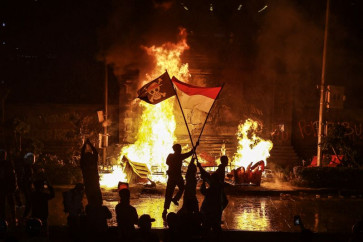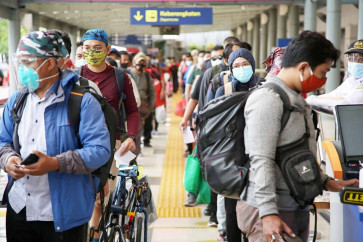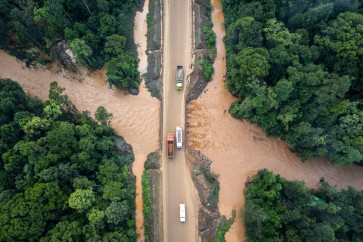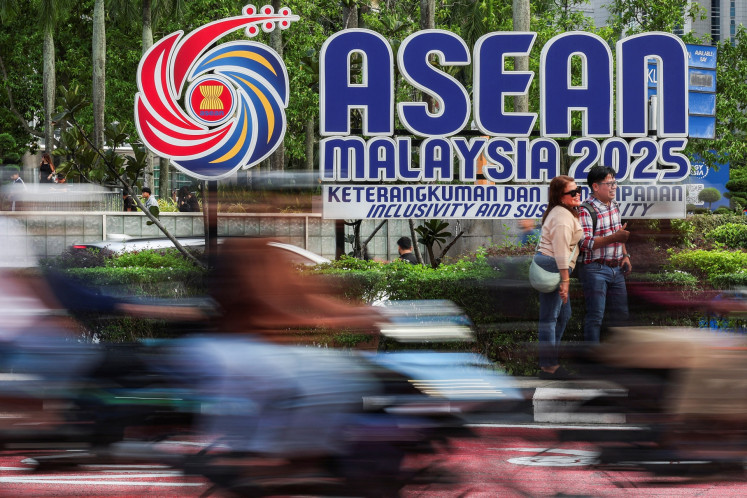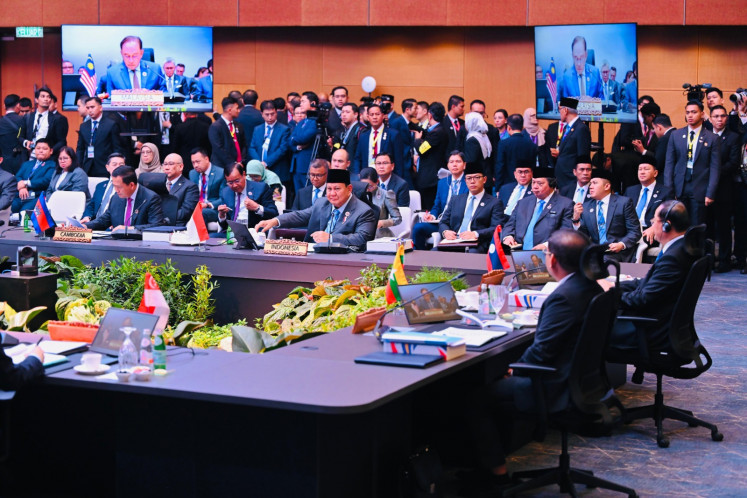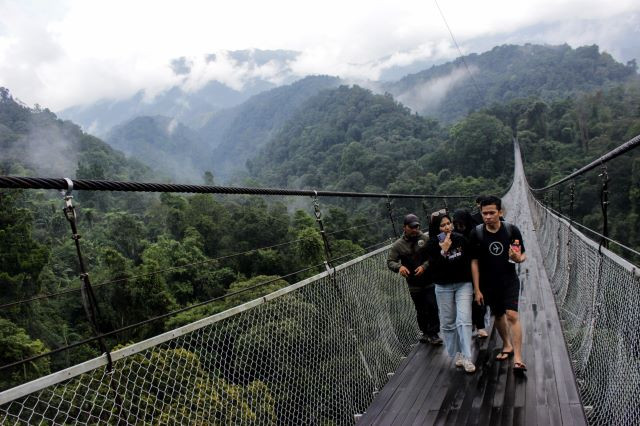Popular Reads
Top Results
Can't find what you're looking for?
View all search resultsPopular Reads
Top Results
Can't find what you're looking for?
View all search resultsInching to 'mental revolution' in port management
Chairperson of the Presidential Advisory Board Sri Adiningsih listens to the explanation of Willem Dedden, senior project manager of the Port of Rotterdam at its headquarters in Rotterdam, the Netherlands on May 29
Change text size
Gift Premium Articles
to Anyone
 Chairperson of the Presidential Advisory Board Sri Adiningsih listens to the explanation of Willem Dedden, senior project manager of the Port of Rotterdam at its headquarters in Rotterdam, the Netherlands on May 29. Adiningsih visited the port to gain insight on better efficiency in Indonesiaâs port management.(Courtesy of Ade Pratikno) (Courtesy of Ade Pratikno)
Chairperson of the Presidential Advisory Board Sri Adiningsih listens to the explanation of Willem Dedden, senior project manager of the Port of Rotterdam at its headquarters in Rotterdam, the Netherlands on May 29. Adiningsih visited the port to gain insight on better efficiency in Indonesiaâs port management.(Courtesy of Ade Pratikno) (Courtesy of Ade Pratikno)
C
span class="caption">Chairperson of the Presidential Advisory Board Sri Adiningsih listens to the explanation of Willem Dedden, senior project manager of the Port of Rotterdam at its headquarters in Rotterdam, the Netherlands on May 29. Adiningsih visited the port to gain insight on better efficiency in Indonesia's port management.(Courtesy of Ade Pratikno)
The Communications and Information Ministry went on its annual mission abroad, this year to the Netherlands. The Jakarta Post was among the invited media to the Indonesia Update 2015 talks and meetings with Dutch and Indonesian members of the public, besides the business circle, from May 27 to 31 in The Hague, Leiden, Utrecht and Rotterdam. Ati Nurbaiti compiled the following reports.
The 'mental revolution' campaigned by President Joko 'Jokowi' Widodo, a wise scholar said, is better understood as an evolution ' given all the odds.
A deputy rector and former dean at the Faculty of Cultural Studies at the University of Indonesia, Bambang Wibawarta, said that for all the attempted changes underway, the individual itself was not yet a target of development.
'It is not clearly outlined in the national development plan,' Bambang said and without a clear cultural strategy, efforts to address improved human resources were scattered across ministries, including those of the education and social affairs ministries.
Indonesians living abroad have expressed impatience. 'Nothing short of a revolution will do,' said Nurhasanah, a lecturer from the University of Makassar studying in Leiden.
She was among most of the about 4,000 eligible voters here who voted for Jokowi. Yet Jokowi is frustrating many people with policies like fuel hikes and the repeated criminalization by police of commissioners and investigators of the Corruption Eradication Commission (KPK), the state body in the forefront of the war against graft.
Although this crisis has dragged on for most of Jokowi's six months in office, 'I'm still optimistic' about Jokowi's leadership, political scholar Ikrar Nusa Bhakti told Indonesians and Dutch citizens in the gatherings here, given his lack of ties to the old political elite.
The meetings were led by Freddy H. Tulung, director general of information and public communications of the Communications and Information Ministry.
The head of Jokowi's Presidential Advisory Board, Sri Adiningsih, shares the optimism; not only as an old schoolmate, apparently. 'The commitment is clearly there to focus on long neglected basic necessities,' she said, such as infrastructure for the ambitious 'maritime highway', improved social protection for the poorest and addressing disparities across the regions. A one-stop service has been launched to simplify the issuance of business permits, but businesspeople still complain of stops and starts.
Where and how, for instance, to start on trimming all the dozens of levies across the ports, part of the immense logistics costs burdening the nation's competitiveness?
To get a glimpse of renowned clockwork efficiency, Adiningsih headed to the Port of Rotterdam, Europe's busiest hub serving its hinterland, the Netherland's neighboring nations from the western area to the Black Sea. In response to her quizzing, port director Roger Clasquin outlined basic port dues ' mainly fees for port authorities, port dues, the pilot boats directing vessels into the port and the tugboats; and discharging fees up to the last move on barges or trains.
Clearance takes an average of up to four days, Clasquin said, compared to over a week at Indonesian ports.
'We're trying to cut logistics costs by 25 percent in a few years,' said Adiningsih, given urgencies such as the looming ASEAN Economic Community.
But the main basic change of paradigm, she said, would be for the government to no longer view the ports as a source of income, with state-owned port operating firm Pelindo aiming for short-term profit ' and Pelindo being only one among several port authorities answerable to different ministries, not to mention political parties seeking access to the state firms' 'contributions' ahead of election campaigns.
In the long term, the high logistics costs ' including for port handling ' hurt competitiveness, the general economy and leads to a loss of jobs, she said. Businesspeople have complained of spending twice the costs to transport logistics by sea compared to sending cargo by truck, despite the congestion.
Clasquin and Willem Dedden, the port's senior project manager, said it took years to 'align the vision' of all stakeholders to turn Rotterdam into a leading port management aiming for business development, where operations were left to the market.
The Port of Rotterdam is already developing cooperation with ports in Indonesia, including Kuala Tanjung in North Sumatra.
Although the process will be slow from aligning visions to a final investment decision alone by different parties, Dedden said 'it's doable'. He cited cooperation with the Sohar Port in Oman, for instance.
To overhaul old paradigms and cut costs, chunks of which have lined many pockets up and down the bureaucracy to official and non-official 'security' for decades, the President knows what he is up against, as the KPK crisis has shown ' 'after all he said he's ready to be unpopular'' at least for the early phase of the presidency, Ikrar said.
The task seems impossible. Rotterdam itself took hundreds of years to develop from a port, which became the center of power struggles among local nobilities. From its beginnings in the 14th century, its importance to the kingdom was recognized with the establishment of the local branch of the Dutch East India Company (VOC), the trade firm leading Dutch ventures to what became 350 years of colonial rule. The port now covers a vast 45 kilometers and is still expanding.
Indonesia, meanwhile, is still wrestling with the legacy of inefficiency and corruption from former governments, which threaten to undermine growth of barely 4.5 percent.
By letting go of some powers, such as clutching control of operations, and instead ensuring the facilitating of businesses 'on a level playing field', Clasquin said, the Rotterdam port proved it could profit in the long run.
Revenues were not from operations, he said; of the 650 million euro last year, half was from land lease and the other 325 million euro was from port dues.
Sixty percent of last year's profit of 240 million euro went to shareholders, including the municipality, while '40 percent always goes into reinvestment' including dredging and road repairs.
The port leaders were shortly to fly to Indonesia again to meet Pelindo leaders, armed with patience honed from experience, it seems ' and confidence stemming from promises of an evolution in Indonesia, however slow.

